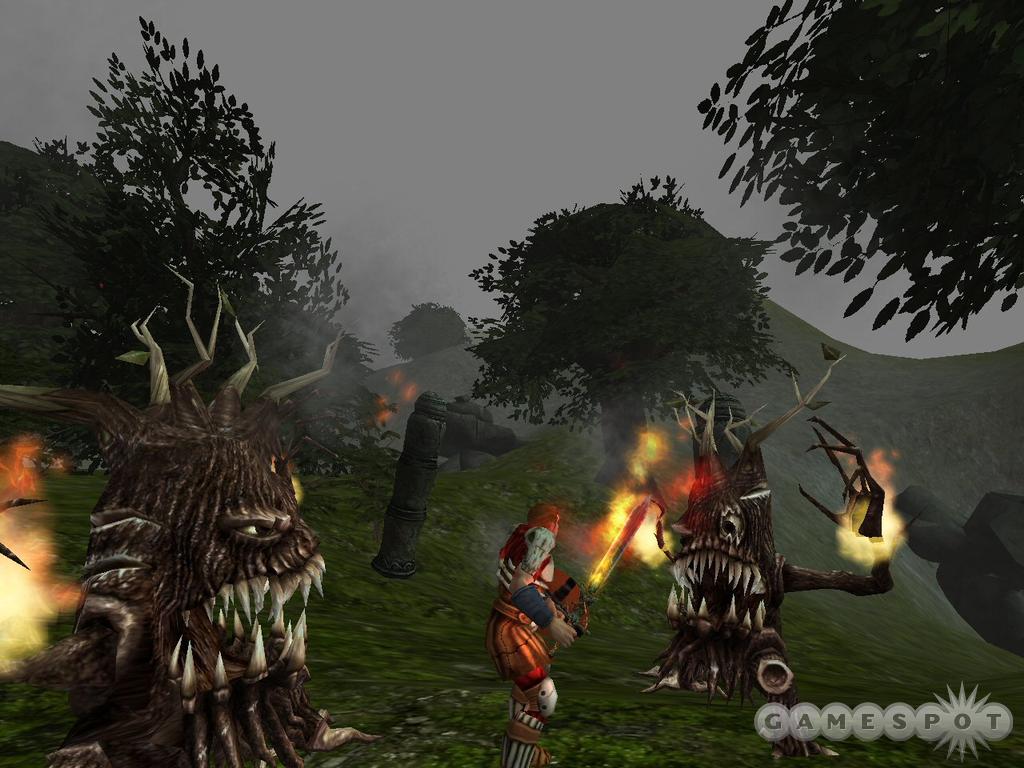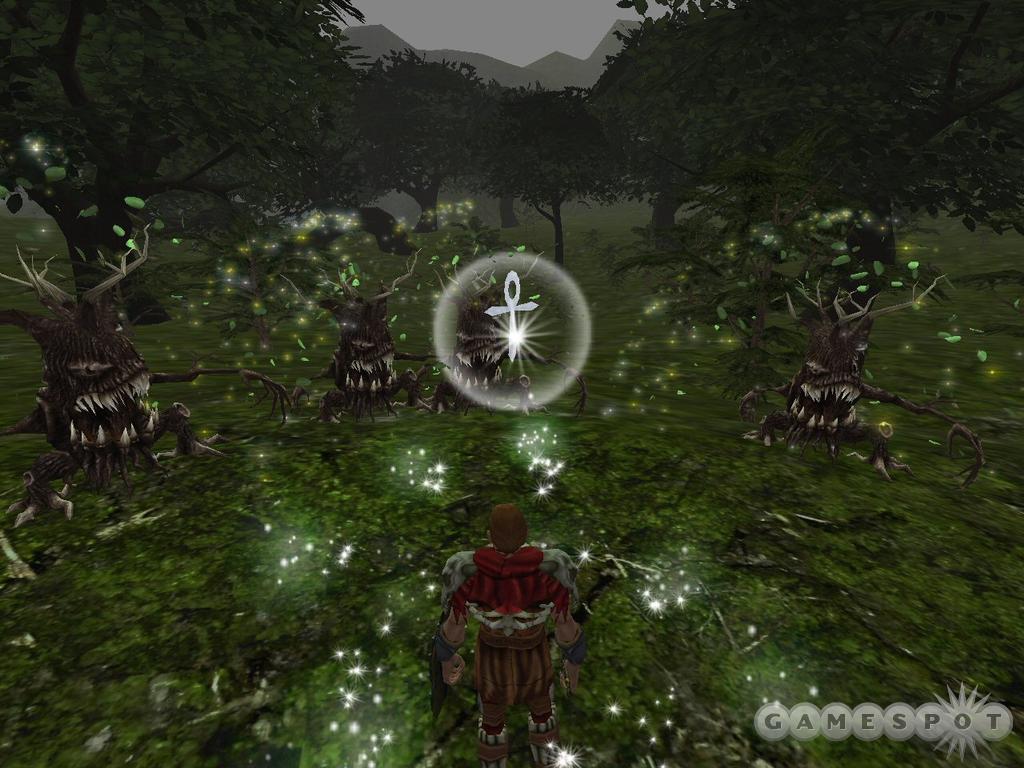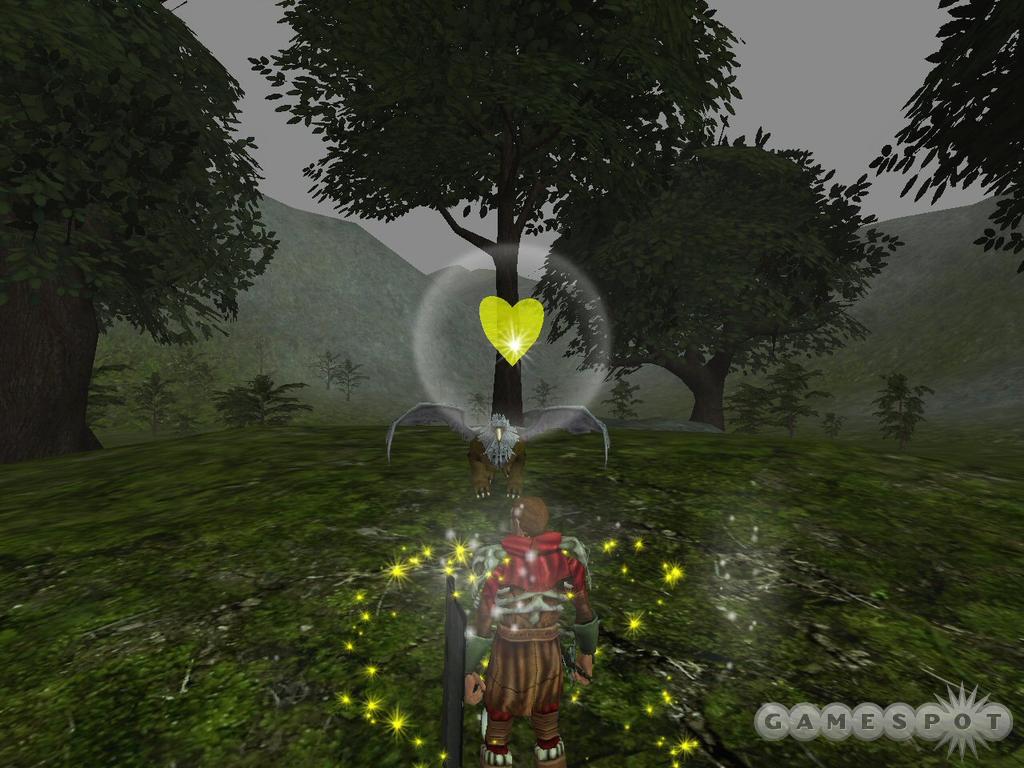Ultima X: Odyssey Designer Diary #4
In this fourth edition of GameSpot's Ultima X: Odyssey diaries, Origin's Jon "Calandryll" Hanna explains how the choices you make will allow you to tailor each quest in unique ways.
Ultima X: Odyssey represents the latest chapter in one of the oldest and most beloved role-playing franchises in all of computer gaming. It's a highly ambitious game, because UXO will feature the massively multiplayer role-playing experience of Ultima Online, and it will also include the epic sense of adventure found in the single-player Ultima games. So while you will be just one of many players running around the vast fantasy world of Alucinor, the designers are working hard to ensure that every adventure you pursue will have a special and, more importantly, personal feel. Origin's Jon Hanna explains how they're designing a game that's up to the task.

Lead Designer, Origin Systems
In our previous designer diary, we discussed how UXO's combat creates a profoundly unique experience requiring well-thought-out strategy and quick thinking. Combat is a lot of fun, but it's even more enjoyable when there is a purpose behind the fight. That's where the Odyssey Adventure System comes in. Questing in online RPGs has long suffered from the same repetitive gameplay problems as combat, but with UXO we're ready to change that.
Questing in most online RPGs unfortunately involves sending you on countless errands, requiring you to run for 10 to 15 minutes (sometimes more!) at time. Nothing ever happens during these quests. There are no surprises, no decisions, and no opportunities for role-playing. Aside from the need to steer your character through the world and click on non-player characters, you barely even need to be at your keyboard. Travel is part of any adventure, but it shouldn't be the entire quest. That's not gameplay. As in the previous diary, I'll use The Lord of the Rings to illustrate my point. Imagine if instead of the harrowing journey, filled with subplots, important decisions, and heroic deeds, Frodo just ran to Mount Doom, threw the ring in the fire, and the quest was over. There would be no drama, no story, and no opportunities for heroism. Unfortunately, that's what passes for quests in many online RPGs.
In UXO, instead of having to wander around looking for NPCs to give you something to do or having to read Web sites looking for lists of quest NPCs, the quests come to you. Going back to the The Lord of the Rings example, imagine if Frodo walked around the shire asking if anyone needed an evil ring destroyed. That would be silly. Instead, the ring quest finds Frodo, and he is thrust into a grand adventure. That's what being a hero is all about, and that's what happens in UXO.
The adventures are all hand-built and take advantage of our private-area technology. For example, you may receive a quest to travel to Red Fang Keep to investigate some strange activities. When you enter the keep, a private version of that map is created, and the quest elements (monsters, ambush points, cinematics, special events, and so on) are loaded on the map. Since you and your party-mates are the only characters on this private map, you can venture through the quest without having to wait in line to fight the boss monster and without having to worry about griefers or kill-stealers. Even though you may have been inside Red Fang Keep before, you'll find that the spawn locations of the monsters, or even the monsters themselves, may be different. Private areas allow us to create very deep quests, filled with surprises and unique challenges.
On top of that, you get to make meaningful choices as you progress through the quests based on how you want to develop your character with respect to the Ultima virtues. Your choices are based on eight virtue abilities (such as valor, spirituality, sacrifice, honesty, and compassion), which earn players special virtue abilities that further define and customize the character's skill set. You'll experience different aspects of the quest and get different rewards based on your choices. I'll walk you through a typical Ultima X: Odyssey adventure to give you an idea of what it's like.
We left off in the previous diary having just finished off a group of rhinorks. You're resting up when suddenly a bright light flashes before you and a man appears. He is an imposing figure dressed in white and gold, and you immediately feel a sense of great power within him. He is the Avatar, hero of Britannia and creator of the world of Alucinor in which you now live. He speaks to you and says that he needs your help. You must travel to Felgoll Forest to help a ranger track down a druid wanted for murder. You gather your courage and agree to help.

After a short trip to a nearby moongate, you and your party teleport to Bane Thicket and find the entrance to Felgoll. You find the ranger who tells you of the druid's misdeeds. You agree to find this druid and learn more about the situation. After a short run, you come upon the druid and learn that he killed the humans because they have been poaching griffins in the forest, driving the beasts to near extinction. He tells you there is only one left and that he will kill again to protect it if necessary. In most online RPGs, you would simply follow a linear storyline, following whatever path the quest forced upon you. But in UXO, you have a choice. You can either demand the druid's surrender for his crimes, or you can seek out the poachers and attempt to save the last living griffin.
Life-and-death decisions with consequences
For now, let's say you decide to demand the druid's surrender. Immediately the druid teleports to safety, but not before summoning tree spirits to attack. Like in the fight with the rhinorks, you and your party must use different tactics to defeat these foes. Tree spirits have an innate resistance to electricity but are vulnerable to fire. Luckily you brought your ornate long sword, which happens to set ablaze anything it hits. The tree spirits try to make up for their inadequacies by casting fire-resistance spells, but your mage quickly removes the spells, and you make short work of them. You and your party gain valor for bravely facing down the druid and his minions, but he escaped, so the quest is not over. 
You return to the ranger and tell him the druid escaped. You and the ranger hatch a plan. There is a shape-shifter in the nearby mage tower who can change himself into a griffin, and if you can convince him to help you, it may be possible to lure the druid into revealing himself again. The ranger doesn't like the shape-shifter, but he agrees it may be your only chance. We'll stop here, because I don't want to give too much away. But let's go back to the first choice and assume that instead of demanding the druid's surrender, you agree to help him with the poachers.
You set off in search of the missing griffin. After battling your way past some evil inhabitants of the forest, you find the griffin surrounded by five figures. At first they appear to be humans as the druid had stated, but as you approach you find they are in fact monsters known as headless. These are humanoid creatures that could be mistaken for humans at a distance. You immediately attack the headless using tactics to defeat their immunity to mind- and sight-based attacks. After dispatching the vile creatures and returning the griffin to the druid, you and your party gain points in compassion since you chose to help the druid. But once again, the quest is not over! Once the druid realizes his horrible mistake in slaying the humans, he agrees to come peacefully to atone for his misdeeds; however, he needs to ensure the forest will be protected in his absence. He asks you to free the tree spirits in a certain grove in the forest. Should you agree and free the tree spirits, they will appear before you, but unlike the tree spirits who were summoned in the previous path of the quest, these will not attack you. Even the monsters react differently based on your choices!
Whether you choose to attack the druid or help his cause, eventually you will need to bring him to the ranger. Or perhaps you don't. In both instances, you are presented with yet another choice. In the first branch of the quest, if you enlist the help of the shape-shifter, you can decide to give full credit for the druid's capture to the shape-shifter. This will help the shape-shifter improve his standing with the ranger, which earns you humility. Or you could tell the truth, which awards you honesty. Likewise, in the second branch of the quest, you are faced with a different decision. After freeing the tree spirits the druid agrees to come with you peacefully, but he begs you to let him go, promising to pay restitution to the families if you let him continue to protect the forest. Letting him go earns you compassion, while telling him that he must face the courts earns you justice.
Gaining in virtue gives you points that can be spent to learn special abilities. They can also be used to imbue items (such as weapons, armor, and even jewelry) with the power of virtue, adding customized and unique powers. Each virtue has a set of powers associated with it. For example, you can learn healing abilities through compassion or strengthen your prowess in battle through valor. You get to tailor your character and your gameplay experience based on how you role-play in the game.

Also, you can venture through the same quest and experience very different outcomes. So not only do you get to choose your reward in each quest, but you also get to choose how the adventure actually plays out. You won't be penalized for making different choices, which allows you to freely role-play your character the way you want without always being forced to follow a linear storyline. The quests offer you a wide array of choices and the chance to become a hero--and that's what role-playing games are supposed to be about.
I hope this gives you an idea about what adventuring in Ultima X: Odyssey will be like. In the next diary, I'll talk about how gaining virtue abilities and imbuing virtue into items combines with character advancement to let you create a very unique and highly customized character.
Got a news tip or want to contact us directly? Email news@gamespot.com
Join the conversation